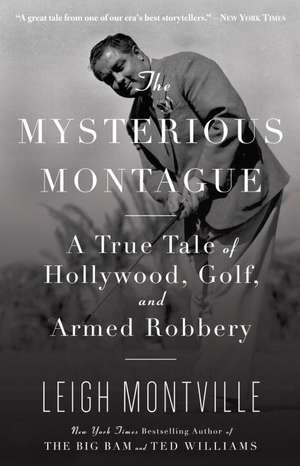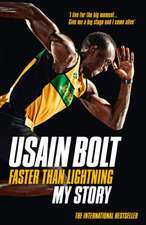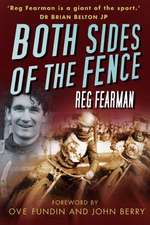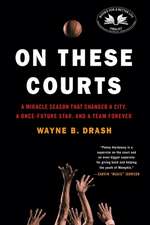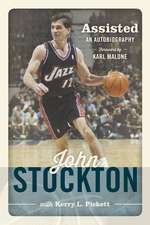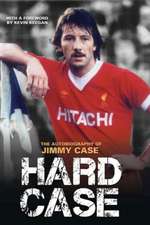The Mysterious Montague: A True Tale of Hollywood, Golf, and Armed Robbery
Autor Leigh Montvilleen Limba Engleză Paperback – 30 apr 2009
Preț: 110.60 lei
Nou
Puncte Express: 166
Preț estimativ în valută:
21.16€ • 22.16$ • 17.51£
21.16€ • 22.16$ • 17.51£
Carte disponibilă
Livrare economică 15-29 martie
Preluare comenzi: 021 569.72.76
Specificații
ISBN-13: 9780767926508
ISBN-10: 0767926501
Pagini: 303
Ilustrații: 8-PAGE BLACK AND WHITE INSERT
Dimensiuni: 130 x 201 x 20 mm
Greutate: 0.32 kg
Editura: Anchor Books
ISBN-10: 0767926501
Pagini: 303
Ilustrații: 8-PAGE BLACK AND WHITE INSERT
Dimensiuni: 130 x 201 x 20 mm
Greutate: 0.32 kg
Editura: Anchor Books
Notă biografică
LEIGH MONTVILLE is a former columnist at the Boston Globe and former senior writer at Sports Illustrated. He is the author of five books, including the New York Times bestsellers The Big Bam: The Life and Times of Babe Ruth, Ted Williams: The Biography of an American Hero, and At the Altar of Speed: The Fast Life and Tragic Death of Dale Earnhardt. He lives in Boston, Massachusetts.
Extras
CHAPTER ONE
THE ADIRONDACKS
1930
The restaurant sat at the bottom of a large bowl of Adirondack darkness. The surrounding mountains, beautiful during the day, forest green and forest wild, still made their presence known during the night. They shut out all horizons: zipped up, locked down, tucked in the well-scattered population between the New York towns of Au Sable Forks and Jay, under a black and tight blanket. The lights from the restaurant were pinpricks of isolated civilization.
The porch light was still lit.
The inside lights were still lit.
Proprietor Kin Hana and his wife, Elizabeth, and an employee, Paul Poland, finished the work of Monday night in the first hours of Tuesday, August 5, 1930. The last three customers were gone, but money had to be counted, tables cleared, floors washed, stock replenished. A last cup of coffee had to be drunk, a joke told.
The restaurant, simply known as Hana's to the local residents, was a roadhouse on Route 9, the two-lane asphalt highway that meandered down from the Canadian border, fifty-eight miles to the north, then to Glens Falls and Saratoga Springs, then Albany and all the way to New York City, Broadway, 275 miles to the south. Adventure had come to the road in 1920, especially in the dark, with the advent of the Eighteenth Amendment, Prohibition, and an atmosphere of car chases and gunplay as smugglers tried to bring distilled spirits from one country to the thirsty citizens of another.
The restaurant was a modest part of the excitement. A man could buy a drink at Hana's, could also buy a bottle to take home, but this was not unusual. A man could buy a drink at most of the roadhouses along Route 9. The area was awash in alcohol. Farmers rented out their barns and hay wagons to smugglers. Mechanics in Saranac Lake fitted out automobiles for the chase, engines cranked to racetrack speed, false gas tanks and false bottoms installed to convey every possible ounce of hard liquor and beer. Freight trains contained hidden cargo. Boats on Lake Champlain carried more contraband than sightseers. The dance was a decade old, a formalized routine of winks and nods, hide-and-seek, punctuated by occasional murders and publicized court trials. Illegality was the norm.
"I believe that 90 percent of the people in the county were opposed to Prohibition," one Au Sable Forks resident later said. "Not one farmer in twenty-five would not shield, help, or hide a rumrunner. The usual compensation for their help was a bottle of liquor, more highly prized than money."
Kin Hana was Japanese, a relentless bundle of hustle and bustle, always on the job, meticulous about cleanliness. He considered himself a restaurant owner, not a bootlegger. The liquor business was something that had developed by circumstance. He provided good food at modest prices, typical American fare, even set up a roadside stand in the summers to sell hamburgers and hot dogs to travelers who didn't have time for a full meal.
His establishment was run with much attention to detail. All kitchen employees had to wear hairnets. He inspected the waitresses every day from behind his rimless glasses, made the women hold out their hands, checked to see if their fingernails were clean, then looked down to see if their shoes were shined. His children laughed at this fussiness, and maybe the waitresses did, too, but never in front of him. He was not a man surrounded by casual chatter and laughter.
His given last name was Hanada, shortened long ago for easier English consumption. His version of the immigrant success story had started when he was a teenager, a cabin boy on a Japanese ocean liner. Left behind in an Anchorage, Alaska, hospital when he fell ill, he decided to move to the United States. He learned the rudiments of a new language, and then embarked on a new life that eventually led to a position as a houseboy for a wealthy family in Au Sable Forks.
Impressed by his good work, the wealthy family sent him to cooking school in Boston. Cooking school led to the restaurant business. He had edged into his late forties now, a familiar figure in the community, and was long married to Elizabeth, a local girl, a Cobb, quiet and religious. They had five children ranging from nineteen to five, three girls and two boys. The color of Hana's skin sometimes drew comments, obvious and stupid, such as "Ching-Ching Chinaman, sitting on a fence"--there almost certainly was no other Asian entrepreneur, maybe no other Asian resident, in all of the Adirondacks--but he always seemed too busy to be bothered by an overheard insult.
The restaurant on Route 9 constituted his entire empire. It was a long, one-story white building that was not only his business, but also his home. The dining room of the restaurant was the largest rentable room in Au Sable Forks, sometimes used for civic functions. The much smaller illegal barroom was tucked next to the kitchen. A door not far from the restrooms at the other end of the dining room opened into the half of the building that was a four-bedroom apartment.
Four of his five children were sleeping in that apartment at this exact moment, two girls in one bedroom, the youngest boy in another. The third daughter, sick with a cold, was asleep on a couch in the living room. Hana's sixty-seven-year-old divorced father-in-law, Matt Cobb, slept in a third bedroom. Hana himself was in the back of the restaurant, locking the storeroom for the night. Elizabeth and Paul Poland were finishing their work in the well-lit dining room. The chores were almost done, the last dot of activity soon to be extinguished into the darkness.
This was when the three men entered the restaurant.
Elizabeth was the first to see them. She hadn't heard any car; the sound of the front door was what made her turn. The men, a curious sight, were standing by the cigar case. Elizabeth registered at first glance that each of them was wearing a soft felt hat and each had a white cloth mask covering his face. Far from alarmed, she almost laughed. She thought these were friends from the nearby town of Keene playing a late-night joke. She was going to say something funny, had it half composed in her head, but then she saw the three revolvers.
They were pointed at her.
***
The night changed with one blink of recognition. The masked visitors were businesslike, gruff, and efficient. The way they held their revolvers, the sense of authority contained in each slight move, said that these were not kids, half drunk and impulsive, picking a random site for random mischief. These were men who knew exactly where they were and what they were doing. They had a plan.
"Be quiet," one of them said.
Neither Elizabeth nor Paul Poland moved. Neither spoke.
"Where's the little fellow?" the same man then said.
The question showed the extent of the men's knowledge. The little fellow? Kin? Before Elizabeth could answer--before she could make up something or tell the truth, what to do?--her husband came out of the stockroom. A revolver immediately was turned toward him.
The demand now was for everyone to lie facedown on the floor. Elizabeth and Paul Poland complied. Kin Hana resisted, reacted to this intrusion; he asked in his fractured second language what was happening. One of the men quickly threw him onto his back. Kin Hana resisted no more.
While two revolvers were trained on the people on the floor, the third gunman went through the door to the apartment at the end of the dining room. He walked directly into Kin and Elizabeth's bedroom, as sure as if he had lived in the house all of his life, and yanked a sheet from the bed. He ripped the sheet into strips that were soon used to gag the mouths and bind the hands and feet of the three captives.
The gunmen now turned out all the lights, even the light on the porch, so no strangers would stumble onto the scene. Not even the summer moths would be attracted to any commotion, the dark business conducted under the focus of flashlights the gunmen had brought with them.
First, the men emptied Kin Hana's pockets, taking whatever cash money he had, disregarding any checks. Second, they removed his gag and asked for the combination of the safe in the master bedroom of the apartment. (They knew about the safe?) He said he didn't know the combination; that his wife always took care of the money. The gunmen turned their attention to Elizabeth.
They undid her bindings and walked her back to the apartment and told her to get to work. Stalling for time, chewing on quiet hope that help somehow would arrive, she balked. She said she wasn't sure of the numbers. One of the gunmen said if she didn't remember, he would dynamite the safe and the building and her children would be in peril. Elizabeth said she remembered now.
All of the activity had awakened the oldest daughter, Naomi, who saw her mother and the masked men pass her bedroom door. She started screaming. One of the gunmen quickly grabbed her, and his accomplices soon rounded up the other children and yanked another sheet off one of their beds. The children were bound and stretched on the floor.
The gunmen decided to take care of all possibilities.
"Where's the old man?" one of them asked.
He was directed--why lie?--to the final bedroom, where he was greeted with a surprise. The grandfather, Matt Cobb, also had been awakened by the noise. He was known in the area as powerful and agile for his age, a fighter, and he was out of his bed, waiting. When the gunman entered the room, Cobb jumped him. The old man pulled down the gunman's mask and started flailing. When the gunman landed on his back and feared he was losing, he called for help.
"Verne!" he shouted.
A second gunman joined the fray. Cobb continued to resist, but now was overwhelmed. A hard crack on his head with the butt of the new arrival's revolver ended the struggle. The gunmen ripped up another sheet, tied up the semiconscious grandfather, and left him on his bed.
The attention turned back to the safe. Elizabeth worked the combination at last, opened the door, and one of the men grabbed all the bills he could see, stuffing them into a pillowcase taken from her bed. He worked so fast that he missed some gold coins and bills in the back.
Business completed, the three men now began to leave the restaurant, off to divide their stolen gains in private. Their departure was not without incident.
Matt Cobb had regained consciousness, escaped from his bindings, and climbed out his bedroom window. He had come around to the front of the restaurant and found a fourth gunman guarding the car, making sure no late-night strangers appeared. The fourth gunman ordered him to go back to the other side of the building. As Cobb complied, he ran into the same gunman who had whacked him with the butt of the revolver.
The fight began again. Cobb again was surprisingly resilient, and the gunman yelled for help. One of his partners rushed to hand him a short length of garden hose filled with buckshot and bolts, tape covering both ends to make an improvised blackjack. The first gunman started to hit Cobb on the head.
"Help!" the old man shouted. "Murder! They're trying to kill me!"
A final whack with the garden-hose blackjack silenced the noise. The two men had rolled down an embankment to the edge of the Au Sable River during the tussle. The gunman stood, brushed off his clothes, and climbed back to the restaurant parking lot, where he rejoined his partners. They hurried into their car and drove into the night.
Left behind were Kin and Elizabeth and Paul Poland and the four children, all bound and gagged and terrified as they lay on the restaurant floor. Matt Cobb, bleeding, unconscious, lay at the side of the river. The children wondered if their grandfather was dead.
***
Sgt. Paul McGinnis and Trooper D. H. Wood from the Malone Barracks of the New York State Police were on patrol for bootleggers on Route 9 at 1:30 in the morning of August 5, 1930. Various measures had been adapted for the perpetual dance with the ever-resourceful opposition--troopers sometimes pulled a six-foot sheet of iron studded with spikes across the road, sometimes tied heavy metal chains to trees a foot off the ground to stop the speeding cars--but the basic element was still the chase.
The state police were the underdogs: overworked, underpaid, and underappreciated. Their average salary was $1,270 a year after eight years of service. They were tempted by the easy money on the other side, and hampered by the indifference of the general population. The smugglers generally had better cars and better public relations. A violent end to the chase, bootleggers shot dead, alcohol confiscated, brought police brutality charges more often than applause. The public liked to drink. The sinners were more popular than the saviors.
All cars on the road at this time of the night in this part of the county were suspicious to the troopers. That was an easy rule. The faster a car was traveling, the more suspicious it became. When McGinnis and Wood saw a Ford roadster hurtling toward them, going south on Route 9, they immediately signaled the car to stop. When it didn't, the chase began.
The driver of the roadster was thirty-five-year-old William Carleton, a veteran of the smuggling wars from Utica. He sometimes used the name William Martin and had been convicted of bootlegging and several other misdemeanors. The passenger was another oft-convicted bootlegger, thirty-two-year-old John Sherry, also of Utica. They were two of the four robbers of the Hana restaurant.
After leaving the scene of the crime in a green Pontiac sedan, the robbers split into pairs when they picked up Carleton's roadster, which had been parked less than a mile down the road. The plan was to meet again in Mechanicville to split up the money. Carleton and Sherry took off first, so they encountered the troopers first.
The chase lasted only a couple of miles. Sergeant McGinnis and Trooper Wood had pulled close, so Carleton and Sherry stopped the Ford roadster in the town of Upper Jay. The troopers also stopped. As McGinnis and Wood stepped from their car, Carleton fired up the Ford's engine, executed a fast U-turn, and steamed north again on Route 9, back toward the Hana restaurant. The troopers returned in a hurry to their own car, made the U-turn, and followed. Somewhere in the new chase, the green Pontiac sedan flew past in the other direction, a fact the troopers noted but were helpless to address. They were already busy.
With a few seconds' lead, Sherry had an idea in the passenger's seat of the Ford. Even though the car was traveling as fast as possible for the road and conditions, maybe fifty miles per hour, he reached across and turned off the headlights. It was an old bootleggers' trick. The idea was that troopers couldn't see the Ford's taillights in the tucked-in mountain dark.
From the Hardcover edition.
THE ADIRONDACKS
1930
The restaurant sat at the bottom of a large bowl of Adirondack darkness. The surrounding mountains, beautiful during the day, forest green and forest wild, still made their presence known during the night. They shut out all horizons: zipped up, locked down, tucked in the well-scattered population between the New York towns of Au Sable Forks and Jay, under a black and tight blanket. The lights from the restaurant were pinpricks of isolated civilization.
The porch light was still lit.
The inside lights were still lit.
Proprietor Kin Hana and his wife, Elizabeth, and an employee, Paul Poland, finished the work of Monday night in the first hours of Tuesday, August 5, 1930. The last three customers were gone, but money had to be counted, tables cleared, floors washed, stock replenished. A last cup of coffee had to be drunk, a joke told.
The restaurant, simply known as Hana's to the local residents, was a roadhouse on Route 9, the two-lane asphalt highway that meandered down from the Canadian border, fifty-eight miles to the north, then to Glens Falls and Saratoga Springs, then Albany and all the way to New York City, Broadway, 275 miles to the south. Adventure had come to the road in 1920, especially in the dark, with the advent of the Eighteenth Amendment, Prohibition, and an atmosphere of car chases and gunplay as smugglers tried to bring distilled spirits from one country to the thirsty citizens of another.
The restaurant was a modest part of the excitement. A man could buy a drink at Hana's, could also buy a bottle to take home, but this was not unusual. A man could buy a drink at most of the roadhouses along Route 9. The area was awash in alcohol. Farmers rented out their barns and hay wagons to smugglers. Mechanics in Saranac Lake fitted out automobiles for the chase, engines cranked to racetrack speed, false gas tanks and false bottoms installed to convey every possible ounce of hard liquor and beer. Freight trains contained hidden cargo. Boats on Lake Champlain carried more contraband than sightseers. The dance was a decade old, a formalized routine of winks and nods, hide-and-seek, punctuated by occasional murders and publicized court trials. Illegality was the norm.
"I believe that 90 percent of the people in the county were opposed to Prohibition," one Au Sable Forks resident later said. "Not one farmer in twenty-five would not shield, help, or hide a rumrunner. The usual compensation for their help was a bottle of liquor, more highly prized than money."
Kin Hana was Japanese, a relentless bundle of hustle and bustle, always on the job, meticulous about cleanliness. He considered himself a restaurant owner, not a bootlegger. The liquor business was something that had developed by circumstance. He provided good food at modest prices, typical American fare, even set up a roadside stand in the summers to sell hamburgers and hot dogs to travelers who didn't have time for a full meal.
His establishment was run with much attention to detail. All kitchen employees had to wear hairnets. He inspected the waitresses every day from behind his rimless glasses, made the women hold out their hands, checked to see if their fingernails were clean, then looked down to see if their shoes were shined. His children laughed at this fussiness, and maybe the waitresses did, too, but never in front of him. He was not a man surrounded by casual chatter and laughter.
His given last name was Hanada, shortened long ago for easier English consumption. His version of the immigrant success story had started when he was a teenager, a cabin boy on a Japanese ocean liner. Left behind in an Anchorage, Alaska, hospital when he fell ill, he decided to move to the United States. He learned the rudiments of a new language, and then embarked on a new life that eventually led to a position as a houseboy for a wealthy family in Au Sable Forks.
Impressed by his good work, the wealthy family sent him to cooking school in Boston. Cooking school led to the restaurant business. He had edged into his late forties now, a familiar figure in the community, and was long married to Elizabeth, a local girl, a Cobb, quiet and religious. They had five children ranging from nineteen to five, three girls and two boys. The color of Hana's skin sometimes drew comments, obvious and stupid, such as "Ching-Ching Chinaman, sitting on a fence"--there almost certainly was no other Asian entrepreneur, maybe no other Asian resident, in all of the Adirondacks--but he always seemed too busy to be bothered by an overheard insult.
The restaurant on Route 9 constituted his entire empire. It was a long, one-story white building that was not only his business, but also his home. The dining room of the restaurant was the largest rentable room in Au Sable Forks, sometimes used for civic functions. The much smaller illegal barroom was tucked next to the kitchen. A door not far from the restrooms at the other end of the dining room opened into the half of the building that was a four-bedroom apartment.
Four of his five children were sleeping in that apartment at this exact moment, two girls in one bedroom, the youngest boy in another. The third daughter, sick with a cold, was asleep on a couch in the living room. Hana's sixty-seven-year-old divorced father-in-law, Matt Cobb, slept in a third bedroom. Hana himself was in the back of the restaurant, locking the storeroom for the night. Elizabeth and Paul Poland were finishing their work in the well-lit dining room. The chores were almost done, the last dot of activity soon to be extinguished into the darkness.
This was when the three men entered the restaurant.
Elizabeth was the first to see them. She hadn't heard any car; the sound of the front door was what made her turn. The men, a curious sight, were standing by the cigar case. Elizabeth registered at first glance that each of them was wearing a soft felt hat and each had a white cloth mask covering his face. Far from alarmed, she almost laughed. She thought these were friends from the nearby town of Keene playing a late-night joke. She was going to say something funny, had it half composed in her head, but then she saw the three revolvers.
They were pointed at her.
***
The night changed with one blink of recognition. The masked visitors were businesslike, gruff, and efficient. The way they held their revolvers, the sense of authority contained in each slight move, said that these were not kids, half drunk and impulsive, picking a random site for random mischief. These were men who knew exactly where they were and what they were doing. They had a plan.
"Be quiet," one of them said.
Neither Elizabeth nor Paul Poland moved. Neither spoke.
"Where's the little fellow?" the same man then said.
The question showed the extent of the men's knowledge. The little fellow? Kin? Before Elizabeth could answer--before she could make up something or tell the truth, what to do?--her husband came out of the stockroom. A revolver immediately was turned toward him.
The demand now was for everyone to lie facedown on the floor. Elizabeth and Paul Poland complied. Kin Hana resisted, reacted to this intrusion; he asked in his fractured second language what was happening. One of the men quickly threw him onto his back. Kin Hana resisted no more.
While two revolvers were trained on the people on the floor, the third gunman went through the door to the apartment at the end of the dining room. He walked directly into Kin and Elizabeth's bedroom, as sure as if he had lived in the house all of his life, and yanked a sheet from the bed. He ripped the sheet into strips that were soon used to gag the mouths and bind the hands and feet of the three captives.
The gunmen now turned out all the lights, even the light on the porch, so no strangers would stumble onto the scene. Not even the summer moths would be attracted to any commotion, the dark business conducted under the focus of flashlights the gunmen had brought with them.
First, the men emptied Kin Hana's pockets, taking whatever cash money he had, disregarding any checks. Second, they removed his gag and asked for the combination of the safe in the master bedroom of the apartment. (They knew about the safe?) He said he didn't know the combination; that his wife always took care of the money. The gunmen turned their attention to Elizabeth.
They undid her bindings and walked her back to the apartment and told her to get to work. Stalling for time, chewing on quiet hope that help somehow would arrive, she balked. She said she wasn't sure of the numbers. One of the gunmen said if she didn't remember, he would dynamite the safe and the building and her children would be in peril. Elizabeth said she remembered now.
All of the activity had awakened the oldest daughter, Naomi, who saw her mother and the masked men pass her bedroom door. She started screaming. One of the gunmen quickly grabbed her, and his accomplices soon rounded up the other children and yanked another sheet off one of their beds. The children were bound and stretched on the floor.
The gunmen decided to take care of all possibilities.
"Where's the old man?" one of them asked.
He was directed--why lie?--to the final bedroom, where he was greeted with a surprise. The grandfather, Matt Cobb, also had been awakened by the noise. He was known in the area as powerful and agile for his age, a fighter, and he was out of his bed, waiting. When the gunman entered the room, Cobb jumped him. The old man pulled down the gunman's mask and started flailing. When the gunman landed on his back and feared he was losing, he called for help.
"Verne!" he shouted.
A second gunman joined the fray. Cobb continued to resist, but now was overwhelmed. A hard crack on his head with the butt of the new arrival's revolver ended the struggle. The gunmen ripped up another sheet, tied up the semiconscious grandfather, and left him on his bed.
The attention turned back to the safe. Elizabeth worked the combination at last, opened the door, and one of the men grabbed all the bills he could see, stuffing them into a pillowcase taken from her bed. He worked so fast that he missed some gold coins and bills in the back.
Business completed, the three men now began to leave the restaurant, off to divide their stolen gains in private. Their departure was not without incident.
Matt Cobb had regained consciousness, escaped from his bindings, and climbed out his bedroom window. He had come around to the front of the restaurant and found a fourth gunman guarding the car, making sure no late-night strangers appeared. The fourth gunman ordered him to go back to the other side of the building. As Cobb complied, he ran into the same gunman who had whacked him with the butt of the revolver.
The fight began again. Cobb again was surprisingly resilient, and the gunman yelled for help. One of his partners rushed to hand him a short length of garden hose filled with buckshot and bolts, tape covering both ends to make an improvised blackjack. The first gunman started to hit Cobb on the head.
"Help!" the old man shouted. "Murder! They're trying to kill me!"
A final whack with the garden-hose blackjack silenced the noise. The two men had rolled down an embankment to the edge of the Au Sable River during the tussle. The gunman stood, brushed off his clothes, and climbed back to the restaurant parking lot, where he rejoined his partners. They hurried into their car and drove into the night.
Left behind were Kin and Elizabeth and Paul Poland and the four children, all bound and gagged and terrified as they lay on the restaurant floor. Matt Cobb, bleeding, unconscious, lay at the side of the river. The children wondered if their grandfather was dead.
***
Sgt. Paul McGinnis and Trooper D. H. Wood from the Malone Barracks of the New York State Police were on patrol for bootleggers on Route 9 at 1:30 in the morning of August 5, 1930. Various measures had been adapted for the perpetual dance with the ever-resourceful opposition--troopers sometimes pulled a six-foot sheet of iron studded with spikes across the road, sometimes tied heavy metal chains to trees a foot off the ground to stop the speeding cars--but the basic element was still the chase.
The state police were the underdogs: overworked, underpaid, and underappreciated. Their average salary was $1,270 a year after eight years of service. They were tempted by the easy money on the other side, and hampered by the indifference of the general population. The smugglers generally had better cars and better public relations. A violent end to the chase, bootleggers shot dead, alcohol confiscated, brought police brutality charges more often than applause. The public liked to drink. The sinners were more popular than the saviors.
All cars on the road at this time of the night in this part of the county were suspicious to the troopers. That was an easy rule. The faster a car was traveling, the more suspicious it became. When McGinnis and Wood saw a Ford roadster hurtling toward them, going south on Route 9, they immediately signaled the car to stop. When it didn't, the chase began.
The driver of the roadster was thirty-five-year-old William Carleton, a veteran of the smuggling wars from Utica. He sometimes used the name William Martin and had been convicted of bootlegging and several other misdemeanors. The passenger was another oft-convicted bootlegger, thirty-two-year-old John Sherry, also of Utica. They were two of the four robbers of the Hana restaurant.
After leaving the scene of the crime in a green Pontiac sedan, the robbers split into pairs when they picked up Carleton's roadster, which had been parked less than a mile down the road. The plan was to meet again in Mechanicville to split up the money. Carleton and Sherry took off first, so they encountered the troopers first.
The chase lasted only a couple of miles. Sergeant McGinnis and Trooper Wood had pulled close, so Carleton and Sherry stopped the Ford roadster in the town of Upper Jay. The troopers also stopped. As McGinnis and Wood stepped from their car, Carleton fired up the Ford's engine, executed a fast U-turn, and steamed north again on Route 9, back toward the Hana restaurant. The troopers returned in a hurry to their own car, made the U-turn, and followed. Somewhere in the new chase, the green Pontiac sedan flew past in the other direction, a fact the troopers noted but were helpless to address. They were already busy.
With a few seconds' lead, Sherry had an idea in the passenger's seat of the Ford. Even though the car was traveling as fast as possible for the road and conditions, maybe fifty miles per hour, he reached across and turned off the headlights. It was an old bootleggers' trick. The idea was that troopers couldn't see the Ford's taillights in the tucked-in mountain dark.
From the Hardcover edition.
Recenzii
“A great tale from one of our era's best storytellers.” —The New York Times“In Montville's skillful hands, Montague's story becomes an epic drama about a potential hero undermined by his troubled past.” —The Boston Globe “A well-paced ride.”—The Washington Post“Hollywood missed this story, but the screen's loss is Montville's—and his readers'—gain.”—Sports Illustrated
Descriere
From the glamour of 1930s Hollywood and John Montague's extraordinary skill on the golf course to the shady world of Adirondack bootleggers, a "New York Times"-bestselling author captures a man and an era with extraordinary color and energy.
